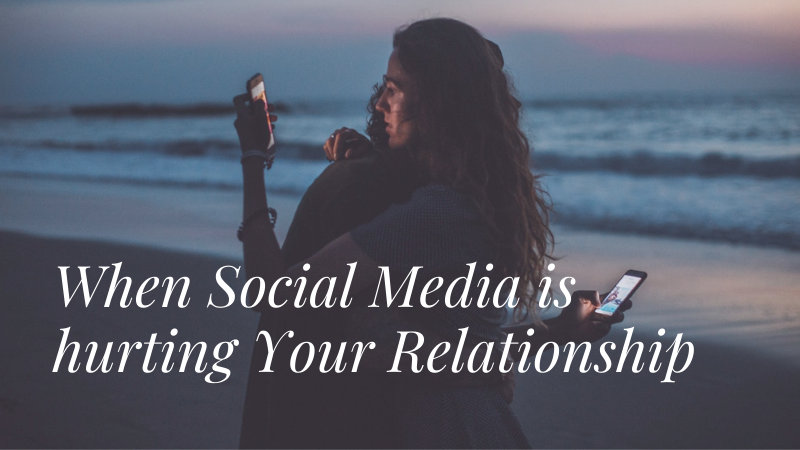This is the topic I recently spoke about on the radio. How social media impacts our relationships? Is social media healthy? Should couples use social media? Well, of course, you can use it, but it is so important to find a healthy balance between social media and relationships offline.
Social media is not necessarily bad for relationships. Research has shown social media use can both positively and negatively affect relationships, but it depends on how it’s used. While social media has its benefits—staying in touch with those we love, getting fresh wedding inspiration, networking, or meeting new friends—our lives online can affect our realities offline. It can even become concerning when one partner’s time on the internet starts to change the dynamic of a relationship.
Social media can contribute to unhealthy comparisons and unrealistic expectations for what relationships are supposed to be like. And couples may spend more time curating an “image” of who they are rather than focusing on the relationship itself. Social media use has also been linked to poor body image and depression, which can negatively affect relationships.
The impact…
Often, our phones are often the first and last thing we see every day, so it’s common to wonder how social media affects every part of our lives, including our relationships.
Romantic bonds can begin through social media, but they can also be damaged by it. Whether it’s a “like” on a photo or one person is talking to other people, it’s easy to become jealous of our partner’s experiences online. But what happens when the problem isn’t caused by who we talk to, but the fact that we’re using social media at all? If you’ve ever felt like you’re competing with your partner’s phone for their attention, you’re not alone. The time we dedicate to our screens can change how we approach our partners in real life.
Time, we dedicate to social media
The time we spend on social media can affect our ability to communicate with those we care about. Research shows that, on average, we spend two or more hours a day on social media.
Fostering relationships online can hurt our relationships offline. Those who have limited experience in reading people do not have the same level of social intelligence that previous generations possess. If this becomes the new normal, building strong, deep relationships will take more time and will be more difficult to maintain.
When we’re constantly tied to our phones scrolling through Instagram, reading the news, or checking emails, we have to learn to balance this time with being offline. It’s especially important to ensure we don’t neglect our loved ones in favour of screen time.
The holds our devices have on us are invisible until someone actively calls it to our attention. Noting that we often pay more mind to our phones than those we’re spending time with. It is almost impossible to create or enhance relationships when social media is, in the first place, taking our time and attention away from who is in front of us.
Social media can create unrealistic expectations
Although there are some useful resources shared via social media. What you will mostly see are curated and filtered posts that only highlight unrealistic images of what a relationship is.
Attempting to measure up can distract you and your partner from the relationship. Inevitably, real-life won’t look like the endless highlight reels we see on social media. Which can lead to disappointment in either yourself, your partner, or both.
You may begin to feel jealous of how much someone posts about their partner. And that might make you feel resentment toward your partner for not doing the same. The lifestyles you are scrolling through may change how satisfied you are in your relationship. Because they seem to be better than what you have.
It can lead to jealousy
Some research has linked social media use with increased jealousy and relationship dissatisfaction. Someone might be prone to jealousy because of an insecure attachment style. That person is more likely to get stuck in a cycle of endless scrolling to keep an eye on their partner’s activities.
People may get upset seeing their partner liking or commenting on other people’s posts. Stoking concerns that their partner is interested in other people (or worse, is already cheating). The use of Facebook, in particular, has been shown to increase feelings of suspicion and jealousy in romantic relationships. This effect may be the result of a feedback loop. Whereby using Facebook exposes people too often ambiguous information about their partner that they may not otherwise have access to.
It can affect our mental health
Social media is meant to promote connection. However, multiple studies have linked social media use with loneliness, mood disorders, and poor self-esteem. People with pre-existing mental health issues may also be more susceptible to social comparisons, due to a negative cognitive bias. On the flip side, lowering social media use has been shown to reduce loneliness and depression symptoms.
Though these issues are more individualistic than relational, they can bleed into romantic relationships. When a partner is suffering from mental health issues, they may be closed off to intimacy or become co-dependent.
Conclusion
Scrolling through social media all day is, unfortunately, not a hard habit to pick up. While these platforms can offer helpful resources, they can also lead to jealousy, mental health issues, and unrealistic expectations in relationships. On top of that, the act of being on your phone constantly can distract from intimacy with a partner.
Social media is not all bad. But if you find yourself comparing your relationship to what you are seeing online, it may be helpful to unfollow accounts that make you feel bad. Try to focus more on accounts that make you feel empowered in your relationship.


